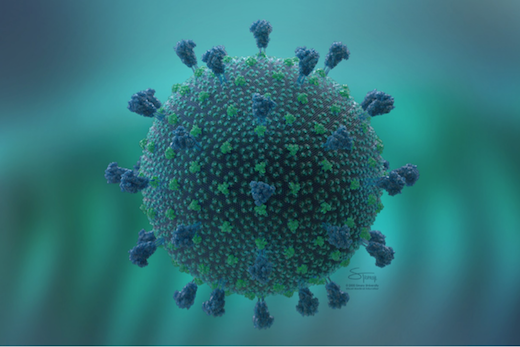The Hope Clinic of Emory Vaccine Center is participating in a clinical study of second-generation COVID-19 vaccines developed by the California-based company Gritstone Oncology.
Gritstone’s investigational COVID-19 vaccines incorporate elements of the SARS-CoV-2 virus beyond the viral spike protein, which currently available vaccines target. Researchers think that adding extra elements besides the spike protein could make newer vaccines more flexible and capable of handling emerging variant strains of the virus.
“This research is an important test of approaches that could help us manage SARS-CoV-2 viral variants and possibly provide flexible immunity,” says Nadine Rouphael, MD, MSc, executive director of the Hope Clinic, and professor of medicine in the Division of Infectious Disease at Emory University School of Medicine.
“These second generation vaccine candidates aim to improve the durability and breadth of vaccine immunity,” says Paulina Rebolledo, MD, MSc, assistant professor of medicine in the Division of Infectious Disease at Emory University School of Medicine, who is leading the project at Emory.
COVID-19 vaccines currently authorized by the FDA may have impaired efficacy against emerging SARS-CoV-2 variants that contain mutations in the viral spike protein affecting interactions with the immune system. Emory’s Hope Clinic is also part of a clinical study testing a modified Moderna mRNA vaccine directed against one of the emerging variants (B.1.351).
These studies are being conducted through the Infectious Diseases Clinical Research Consortium (IDCRC). Emory is one of four IDCRC sites participating in the Gritstone study. The others are at Saint Louis University, Baylor College of Medicine and the University of Washington. The studies are sponsored by the National Institute of Allergy and Infectious Diseases (NIAID), part of the National Institutes of Health.
The Gritstone study will assess the immunogenicity and safety of the company’s CORAL COVID-19 vaccines in healthy adult volunteers in two age groups; 18 to 60 years old and those over 60 years old. It is open-label, meaning that no placebos are involved, and organizers and participants will know which vaccine a participant receives.
This study is analyzing two types of vaccine in parallel. One is based on an adenoviral vector and another uses self-amplifying mRNA. The vaccines being tested express either SARS-CoV-2 spike protein alone, or spike protein plus additional parts of SARS-CoV-2 that react with T cells, immune cells that provide protection that is independent from antibodies. More information about the study design is available at clinicaltrials.gov.
Participants will be asked to come to the Hope Clinic to receive two injections of vaccine and several follow-up visits over the next 13-16 months. Clinic visits include blood draws for safety monitoring and to see whether the investigational vaccine resulted in a strong immune response. Clinical research staff will also be in contact with participants by telephone to keep track of how they are feeling.
Volunteers should not have been vaccinated with one of the currently available emergency use authorized COVID-19 vaccines. In addition, they also should not have a known history of COVID-19 or SARS-CoV-2 infection. They need to not have health conditions that are associated with an increased risk of severe illness from SARS-CoV-2 infection, such as cancer, heart conditions, type 2 diabetes mellitus, severe obesity or chronic kidney disease.
Those interested in participating in the trial at Emory can fill out a volunteer form or contact the Hope Clinic.
About Infectious Disease Clinical Research Consortium (IDCRC)
The IDCRC, consisting of the Vaccine Treatment and Evaluation Units (VTEUs) and the IDCRC Leadership Group, was formed in 2019 to support the planning and implementation of infectious diseases clinical research that efficiently addresses the scientific priorities of NIAID. The consortium includes infectious diseases leaders and clinical researchers from Emory University, University of Maryland School of Medicine, Baylor College of Medicine, Cincinnati Children’s Medical Center and University of Cincinnati, FHI360, Fred Hutchinson Cancer Research Center, Johns Hopkins University, Kaiser Permanente Washington Health Research Institute, New York University, Saint Louis University, Vanderbilt University Medical Center, University of Alabama at Birmingham, University of Rochester, University of Washington, and NIAID.

